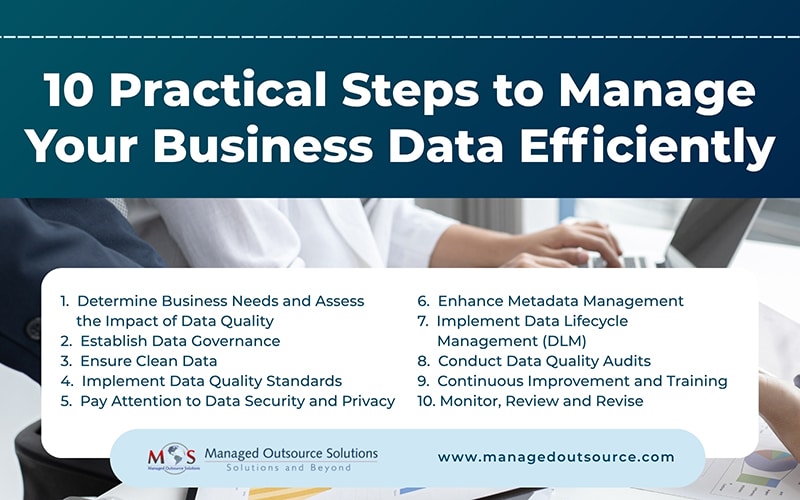Digital data rules the world and is growing at a fast pace, driven by factors like increased Internet access, technological advancements, the Internet of Things, cloud computing, social media and AI applications. The World Economic Forum estimated that by 2025, 463 exabytes of data would be created each day globally – which translates to 212,765,957 DVDs per day! Efficient data management is essential to ensure accurate, reliable and consistent, and accessible information that can provide business insights and value. Today, businesses are outsourcing information management processes from data mining and entry to cleansing and conversion to manage data effectively and gain a competitive edge. AI-poweredbusiness process outsourcing services are changing the game through advanced information management strategies that enhance efficiency, accuracy, and decision-making across the enterprise.
This post shares practical tips to help businesses manage the flood of big data and harness its power to improve operations, enhance customer experiences, and stay competitive.
Best Practices for Efficient Business Data Management
Here are 10 practical steps to manage your business data more efficiently:
- Determine Business Needs and Assess the Impact of Data Quality
The first step in any data quality improvement initiative is to clearly define your business goals. These goals will guide your organization’s data requirements and help prioritize data quality efforts. Keeping these objectives at the forefront of all business activities ensures that data initiatives directly support overall strategy.
As part of this step, focus on achieving early wins, identifying core operational processes, and assessing potential risks. This allows you to develop contingency plans to mitigate issues before they affect performance.
Evaluating the relationships between data assets, business processes, and key performance indicators (KPIs) is essential for identifying data quality issues and understanding their impact on business outcomes—especially revenue. Key actions in this stage include:
- Securing leadership support and engaging key stakeholders
- Aligning data requirements with strategic business objectives
- Identifying all data sources, including internal systems, customer databases, secondary sources, and external data providers
- Establish Data Governance
Data is a strategic asset, but to ensure that it drives value, the right approach is necessary to improve how data is used, analyzed and shared across the organization, increase data accountability, and improve results. To establish proper data governance and Information stewardship, establish stakeholder and team roles and responsibilities for data management oversight and data accountability. Implement guidelines and procedures for data handling, ensuring consistency and adherence to regulations like GDPR or CCPA. To ensure your data governance framework remains updated, stay informed about evolving technologies, regulations, and business needs. Airbnb’s Data University is an example of successful data governance. This in-house educational initiative is designed to boost data literacy across all departments, preparing employees to understand, interpret, and use data effectively in their roles.
- Ensure Clean Data
Maintain high quality data by implementing data validation and leveraging professional data cleansing services. Assess data structure, content, and relationships to identify issues like missing values, inconsistencies, and duplicates. Utilize data profiling tools to automate data analysis and gain insights into the quality of data. Conducting regular audits can help identify errors, inconsistencies, or duplications in datasets.
- Implement Data Quality Standards
Once data issues are resolved, it’s essential to establish a high-quality data standard that aligns with your organization’s strategic goals. This standard should guide key business milestones, ensuring progress toward goals is achieved efficiently and within the expected timeframe. Implementing clear data quality standards emphasizes the value of accurate, reliable data across the organizations, helping to maintain stakeholder engagement and support.
Promoting a data-driven culture fosters policies that ensure data is consistent, accessible, and actionable. This not only supports better and faster decision-making but also helps attract and retain top talent and influential stakeholders.
- Pay Attention to Data Security and Privacy
Data breach is one of the most important concerns when it comes to efficient data management. Citing from latest research reports, Secure Frame shares that the average cost of a data breach in 2024 was $4.88 million, with a projected annual cost of cybercrime worldwide reaching $10.5 trillion by 2025.
To protect sensitive information from breaches, implement data security best practices such as strong encryption, access controls, and regular security audits. In this context, prioritize adherence to relevant data protection laws and regulations, such as GDPR or CCPA. It’s also important to have a robust backup and disaster recovery strategy to minimize data loss and downtime.
- Enhance Metadata Management
Manage metadata by cataloging, standardizing, and using tools to automate collection and organization. Meta data tagging makes digital assets easier to find, organize, and manage. Classifying assets with metadata allows teams to track essential details, such as key dates tied to a digital asset’s record. This visibility ensures that everyone knows when a file was modified or updated, reducing confusion and improving collaboration. When implemented accurately, metadata classification streamlines workflows, prevents duplicated efforts, and enhances overall efficiency.
- Implement Data Lifecycle Management (DLM)
DLM is a policy-based approach to managing data from its creation to its eventual disposal or archival. Establish structured processes for handling data throughout its entire existence within an information system. DLM ensures data is appropriately stored, protected, and managed at each stage of its lifecycle, maximizing its value and alleviating potential risks.
- Conduct Data Quality Audits
Conducting regular data quality audits against predefined metrics provides assessment on how well the data protection obligations are followed at your organization. Perform a comprehensive assessment of all data for quality, completeness and accuracy throughout its lifecycle to ensure consistency. Audits identify areas for improvement and help in implementing corrective solutions.
Use a visual dashboard to track, analyze, and aggregate data quality trends over time, helping inform future operational improvements. These dashboards also monitor the impact of data integration, transformation, and manipulation on operational efficiency. When tailored to your company’s specific needs, a quality dashboard becomes a powerful tool for communicating data integrity and performance to stakeholders, clients, and managers—offering a clear view of your business’s long-term health.
- Continuous Improvement and Training
A data quality strategy is not a one-time effort but rather an on-going process that requires improvement. It involves root cause analysis, encouraging feedback loop, and leveraging technologies. Continuous improvement towards data quality isn’t always about linear progression but also about preventing future mistakes. Appropriate correction of the root cause ensures that your data quality strategy remains effective in the long run, aligning with the evolving business needs and trends.
To encourage a data-driven culture in your organization, it is necessary that all staff members in every department participate equally, while sustaining their individual interests and passion towards the work. Effective communication from the senior level encourages your staff to share innovative ideas. Giving access to data within the corporation and specialized trainings help to develop a high-quality data strategy at your company. Regular training for the usage of metrics, concepts and tools will help your staff stay up-to-date with the latest trends and technology in their area of work.
- Monitor, Review and Revise
Maintaining data quality requires a dynamic approach. It’s essential to be proactive in constantly monitoring, reviewing and revising it regularly to ensure that it remains relevant and aligns with your business objectives. Communicate the results of data quality tests, errors made and improvements achieved with your staff, stakeholders and clients. Understanding the quality of your data by documenting the progress, actions and results goes a long way in improving the knowledge and practices required to maintain high data quality standards.
However, even improving data quality through efficient practices can be challenging due to the growing volume and complexity of data, inconsistent data sources, lack of standardized processes, and limited resources or expertise to maintain data quality, security, and accessibility. Given the complexities involved, many businesses are partnering with outsourcing solutions that combine advanced technology with expert support.
Leverage the Power of AI for Data Management through Outsourcing Solutions
AI is transforming data management by automating tasks such as data classification, cleansing, integration, and anomaly detection. Leveraging AI applications enables faster processing, real-time insights, and predictive analytics—empowering businesses to make smarter decisions with less manual effort.
The good news is that business process outsourcing solutions for data management are available. BPO companies leverage robotic process automation and advanced AI tools, offering scalable, cost-effective solutions without the need for heavy in-house investment. They offer technical expertise, ensure compliance, and help businesses harness AI capabilities to maintain high data quality for enhanced decision making and operational efficiency.





